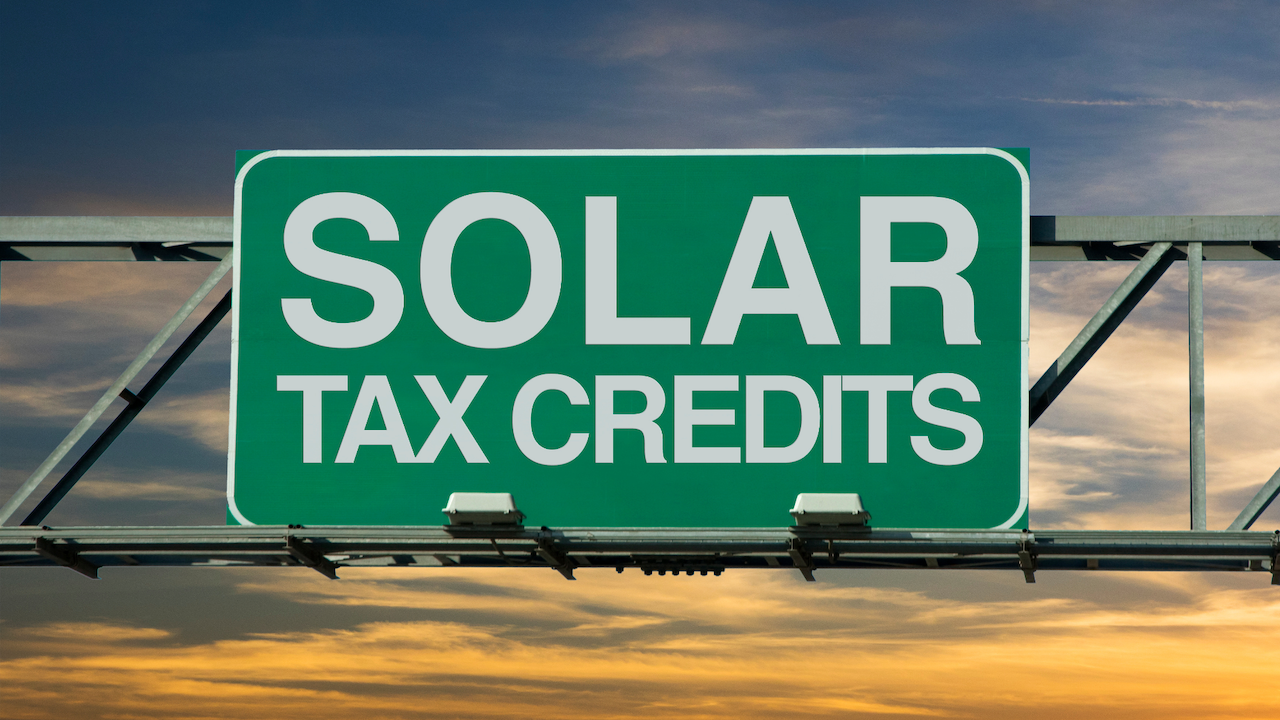Image source: Canva.com
As we explore the world of solar energy, it’s essential to understand the various incentives, tax credits, and rebates available to Pennsylvania residents. These financial aids can significantly lower the cost of installing a solar energy system, making it a more accessible and affordable option for many homeowners.
In this article, we will break down each of these incentives, offering a comprehensive guide to help you navigate the landscape of solar energy benefits in Pennsylvania.
The Residential Clean Energy Credit
The Residential Clean Energy Credit, previously known as the Federal Investment Tax Credit (ITC), can reduce the cost of your solar panel system by 30%. This incentive covers the entire system, including equipment, labor, permitting, and sales tax.
To claim this incentive, you need to purchase your system with cash or a solar loan, as leasing does not qualify for the ITC. You must have a sufficient federal tax liability to use the credit, though any unused portion can be rolled over year-to-year until the ITC expires at the end of 2034. Direct payment of the ITC is only available to tax-exempt entities, such as nonprofit organizations.

How to Make the Most of the Solar Tax Credit in 2024
Net Metering
Net metering in Pennsylvania allows residents and businesses with renewable energy systems, such as solar panels, to receive credits for the excess electricity they generate and supply back to the grid. This system enables customers to offset their future electricity bills, promoting the adoption of renewable energy sources.
Eligibility and System Capacity Limits:
- Residential Customers: Eligible for net metering with systems up to 50 kilowatts (kW) in capacity.
- Non-Residential Customers: Eligible with systems up to 3 megawatts (MW).
- Special Cases: Systems between 3 MW and 5 MW may qualify if they are available to the grid during emergencies or are part of a microgrid maintaining critical infrastructure.
Compensation for Excess Generation:
- Monthly Credits: Excess electricity generated is credited at the full retail rate to the customer’s next bill.
- Annual Reconciliation: At the end of a 12-month billing cycle, any remaining excess credits are compensated at the “price-to-compare” rate, which includes generation and transmission charges but excludes distribution components.
Additional Provisions:
- Virtual Meter Aggregation: Customers can aggregate meters from multiple properties they own within the same utility’s service area and two miles of the generation site.
- Third-Party Ownership: Models such as power purchase agreements and solar leases are permitted for net-metered systems.
In 2024, Pennsylvania updated its net metering policies to simplify the application process and enhance compensation rates for excess energy, making participation more accessible and rewarding for solar users.
Solar for All
To participate in net metering, residential solar energy systems must not exceed a capacity of 50 kW, while non-residential systems are limited to 3,000 kW. The energy generated should not surpass 110% of the customer’s anticipated annual electricity consumption, except when the system is leased. If the customer owns the solar energy system, only the size limits apply: 50 kW for residential and 3,000 kW for non-residential customers.
- The Community Power Coalition (CPC)’s SFA program, “Powering America Together,” will collaborate with and enhance the impact of the US Department of Energy’s National Community Solar Partnership and Community Power Accelerator program. Led by Inclusive Prosperity Capital, Inc., CPC comprises seasoned community solar experts who have contributed to the Community Power Accelerator as developers, lenders, trainers, and technical assistance providers. The program aims to support the development of low-income community solar projects, reduce carbon emissions, lower energy costs, and promote quality jobs, community wealth-building, energy resilience, and equitable workforce development.
- The Pennsylvania Solar for All (SFA) Program will facilitate the deployment of residential solar, storage, and associated upgrades in low-income and disadvantaged communities throughout Pennsylvania. The program aims to provide substantial benefits, including household savings, quality jobs, and community ownership, to rural, urban, and suburban areas, as well as energy communities and persistent poverty counties. By offering a strategic mix of financial subsidies, thoughtful program design, and project deployment services—such as community outreach and workforce development—the initiative will also strengthen the overall market for residential solar.
- Based in Ohio, the Industrial Heartland Solar Coalition brings together 31 communities across eight states, spanning from the Midwest to the rustbelt. Led by Growth Opportunity Partners (Growth Opps), the coalition is committed to propelling a just and clean energy transition in America’s industrial heartland communities. Its Solar for All (SFA) program, centrally managed by Growth Opps, is locally guided and implemented by 18 coalition members. Through our SFA initiative, the coalition aims to deliver energy savings to households, reduce greenhouse gas emissions, and provide training through solar workforce development programs. By leveraging tax credits and SFA grant funds, the coalition seeks to reach low- and moderate-income households, installing residential rooftop solar and more.
- The Clean Energy Fund of Texas (TxCEF), in collaboration with the Bullard Center for Environmental and Climate Justice at Texas Southern University (BCECJ), collectively known as CEFBC, is dedicated to deploying technical assistance, private capital, and grants to minority-serving institutions. Together, these organizations aim to facilitate the establishment of residential-serving community solar projects in low-income and disadvantaged communities that face significant challenges related to energy policy and grid vulnerability. These projects are anticipated to result in emissions reductions, savings on household utility bills, generation of shared revenues through community ownership, and the mobilization of private capital.
- Teaming up with lead applicant GRID Alternatives, a coalition of ten mission-driven nonprofit solar and affordable housing providers and allies has collaborated to develop the Solar Access for Nationwide Affordable Housing Program (SANAH). SANAH is meticulously crafted to maximize benefits for households and communities while advancing equity, reducing harmful pollution, and combating climate change.
The program offers a multitude of advantages, including expanded access to solar and storage for income-qualified households, significant energy savings and relief from burdensome costs, as well as additional benefits like efficiency improvements and electrification.

Solar for All
Homeowners Energy Efficiency Loan Program (HEELP)
This unique state incentive supports energy-efficiency repairs for homeowners in Pennsylvania. Eligible borrowers can access loans ranging from $1,000 to $10,000 at an interest rate of 1% over ten years, with the option to prepay without penalties.
Funds acquired through HEELP can be used for various energy efficiency improvements, including:
- Enhancing air sealing
- Improving insulation
- Upgrading ductwork
- Installing energy-efficient windows and doors
- Repairing or replacing energy-efficient heating or cooling systems
- Conducting roof replacements
Solar Energy Program (SEP)
The Solar Energy Program (SEP) in Pennsylvania is a state initiative aimed at expanding solar energy usage and supporting the solar industry through financial assistance. By offering grants, loans, and loan guarantees, the SEP provides funding to encourage solar energy generation and the development of solar technology. The program is jointly administered by the Department of Community and Economic Development (DCED) and the Department of Environmental Protection (DEP), under the guidance of the Commonwealth Financing Authority (CFA).
Types of Funding
The program offers three types of financial assistance: grants, loans, and loan guarantees.
Grants
- For Solar Equipment Manufacturers: Grants up to $5,000 are available for each new job created within three years after loan approval.
- For Solar Energy Generation/Distribution Projects: Grants can reach up to $1 million or $1.50 per watt (whichever is less).
- Solar Renewable Energy Credits (SRECs): In exchange for receiving grant funding, solar PV projects must contractually agree to transfer ownership of SRECs generated by the system to the CFA for the project’s duration.
Loans
- For Solar Equipment Manufacturers: Loans of up to $40,000 are available for each new job created within three years of loan approval.
- For Solar Energy Generation/Distribution Projects: Loans can go up to $5 million or $3.00 per watt, whichever is lower.
Loan Guarantees
Loan guarantee grants cover up to $5 million with a maximum term of five years. In case of a loan default, the guarantee will cover up to 75% of the deficiency.
Solarize Philly
The Solarize Philly program is a citywide initiative designed to simplify and reduce the cost of solar installation for Philadelphia residents. When homeowners sign up for Solarize Philly, they receive a complimentary solar project proposal. These proposals are customized based on the homeowner’s electricity usage and available roof space, ensuring optimal energy savings.
The Philadelphia Energy Authority (PEA) has negotiated discounted rates with solar installers and equipment suppliers to offer competitive pricing. The program ensures that the selected installers are reputable, contracts are standardized with consumer protections, and the equipment meets high-quality standards with appropriate warranties.
Additionally, Solarize Philly includes the Solar Savings Grant Program, which helps low- and moderate-income households participate. PEA provides a grant to cover part of the project cost, enabling participants to finance the remaining amount and start saving in the first year.
The High Performance Building Program (HPB)
The High Performance Building Program (HPB) in Pennsylvania provides grants and loans to promote the construction or renovation of energy-efficient buildings. Administered by the Department of Community and Economic Development (DCED), the program aims to offset costs associated with high-performance building standards, enhancing energy efficiency and sustainability. This initiative supports commercial, industrial, and residential projects, contributing to the state’s environmental goals.
The City of Philadelphia’s Streamlined Solar Permitting and Fee Reduction program
The City of Philadelphia’s Streamlined Solar Permitting and Fee Reduction program simplifies the process and reduces fees for installing solar energy systems. This initiative encourages the adoption of solar energy by making it easier and more cost-effective for residents and businesses to obtain the necessary permits for solar installations, promoting the use of renewable energy within the city.
Solar Alternative Energy Credits
In Pennsylvania, Solar Renewable Energy Certificates (SRECs) are tradable credits that represent the environmental benefits of generating one megawatt-hour (MWh) of electricity from a solar energy system. These certificates are integral to the state’s Alternative Energy Portfolio Standards (AEPS), which mandate that a specific portion of electricity sold by utilities comes from renewable sources, including solar power.
How SRECs Work:
- Generation: For every 1,000 kilowatt-hours (kWh) of electricity produced by a solar system, the owner earns one SREC.
- Trading: SRECs can be sold to electricity suppliers who need them to meet their renewable energy obligations under the AEPS. This provides an additional revenue stream for solar system owners.
Participating in the SREC program not only offers financial benefits but also supports the broader adoption of renewable energy within the state.
Discover the Ideal Solar System for Your Home in Just a Few Clicks!
Disclaimer
The information provided herein is for informational purposes only and is accurate as of the time of publication. Please be aware that the solar energy landscape, including technology, regulations, incentives, and market conditions, changes frequently. Therefore, it is essential to consult with qualified experts and professionals before making any decisions regarding solar energy installations or investments. This will ensure that you receive the most current and applicable advice tailored to your specific circumstances.





